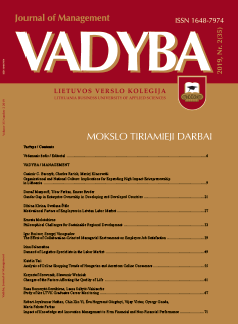LIFE CYCLE SPECIFICS OF EDUCATIONAL PROJECTS IN THE CONTEXT OF SLOVAK EDUCATION ENVIRONMENT
LIFE CYCLE SPECIFICS OF EDUCATIONAL PROJECTS IN THE CONTEXT OF SLOVAK EDUCATION ENVIRONMENT
Author(s): Kateřina Bočková Loudová, Gabriela Gabrhelová, Daniel LajčinSubject(s): Education, State/Government and Education
Published by: Lietuvos verslo kolegija
Keywords: Educational project; project life cycle; project management; European Union; IPMA International Competence Baseline;
Summary/Abstract: Understanding of the project life cycle is one of the key areas of project manager knowledge. The primary reasons are the different requirements of project management in individual phases of the project reflected in the expectations of stakeholders, in project settings in within the activities scheduling, in subsequent execution of activities and in related involvement and workload of project team members, in cost management and time schedule. A frequent problem is therefore that the project itself is often perceived only through its implementation phase and omits the period and activities before and after outputs completion, which also have their specificities requiring attention and management. In addition to different perceptions of the project life cycle, the question is also its standardization in terms of breakdown into phases with more precise description of their content. Each methodology has its own view and rationale for the breakdown, and from the point of view of the bestknown standards and norms we encounter a breakdown from three to six phases. It is important to add that it is not possible to apply individual methodologies across all types of implemented projects, which increases the importance of the role of the project manager in the whole process. He should understand and correctly apply appropriate project management methods in conjunction with the expected inputs and outputs for the relevant project phase. Requirements for inputs and outputs are identically included in standards and norms differently - from basic recommendations to comprehensive definitions of the content of prepared documents and applied procedures. One of the possible criteria for the classification of educational projects is the type of financing. This is an important determinant of the assumption of life cycle deviations for projects financed by the EU Structural Funds, projects financed by private sources and otherwise financed projects. The essential of this paper is to evaluate the life cycle of educational projects financed by the European Union Structural Funds and to propose recommendations primarily aimed at improving project management from the perspective of the contractors entering the projects. The essential will be developed through the following sub - objectives: To identify (from the perspective of the contractor) the life cycle specificities in educational projects financed by the European Union Structural Funds. To identify (from the perspective of the contractor) the life cycle specificities in educational projects financed by the European Union Structural Funds against the chosen methodological basis. To propose recommendations for improving the project management of contractors entering educational projects based on identified similarities and deviations. In the theoretical part of the paper we will use the content-causal analysis, in which we will concentrate on literary resources dealing with the issues of project life cycle. In the analytical part we pay attention to the identification of the life cycle of educational projects financed from the EU Structural Funds from the perspective of an external contractor participating in various phases of their life cycle. The methodology of the analysis itself is based primarily on the methods of induction and deduction, comparison and synthesis. All obtained results are processed by method of synthesis with detailed description in discussion. The aim is to identify similarities and deviations from the project life cycle specified in the IPMA International Competence Baseline, version 4 (IPMA ICB). The analysis of educational projects financed by EU Structural Funds allowed us to formulate a set of statements expressing the basic deviations perceived from the perspective of the contractor at selected phases of the project life cycle We assume that the life cycle of the educational project shows its specifics regarding the type of financing, the implementation of the proposed recommendations can be expected to improve project management in them. The formulation and verification of the assumption is based on the principle of ceteris paribus and we do not expect any other additional effects on the analysed educational projects.
Journal: VADYBA
- Issue Year: 36/2020
- Issue No: 1
- Page Range: 25-32
- Page Count: 8
- Language: English

